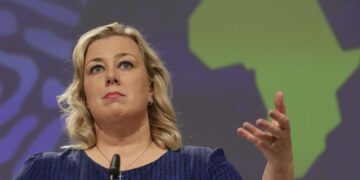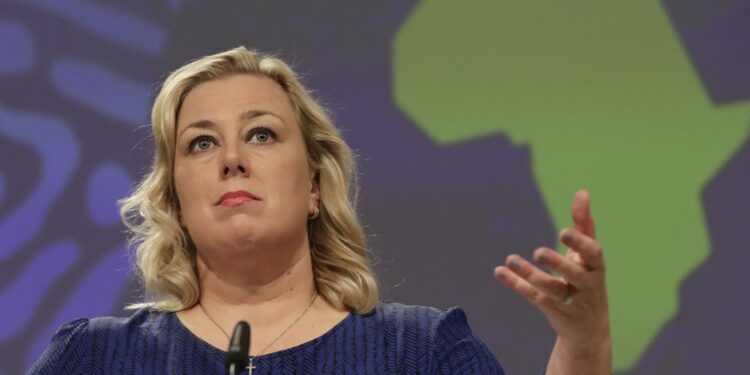By John Ikani
The European Union (EU) has unveiled an ambitious plan to allocate 150 billion Euros by 2027 through its Global Gateway Initiative to Nigeria and other African nations, focusing on enhancing infrastructure across eight key sectors.
Announcing this initiative in Abuja, the EU Commissioner for International Partnerships, Jutta Urpilainen, said the aim of the Global Gateway project is to boost connectivity, promote sustainable development, and strengthen economic relationships between the EU and its partner nations, including Nigeria.
Under this program, the EU intends to bolster Nigeria’s infrastructure connectivity in transportation, energy, and digital networks, while also supporting agriculture, economic growth, health, and education.
In addition, “it will promote sustainable development, environmental protection, and foster cooperation and partnerships with Nigeria and other participating countries,” said Urpilainen.
In her statement, Ms. Urpilainen emphasized the need for resilient global connections, especially in a world marked by geopolitical tensions and conflicts.
She views the Global Gateway strategy as a constructive approach to address various contemporary challenges, ranging from climate change to healthcare improvements.
Together, the EU and its partners aim to mobilize a total of 300 billion Euros in investments by 2027, with half of these funds designated for Africa, which translates to 150 billion Euros. Nigeria plays a prominent role in this comprehensive investment package.
Urpilainen went on to note that the EU is committed to supporting the rollout of 5G technology in Nigeria, reinforcing the digital economy, and exploring potential financial assistance for Small and Medium Enterprises (SMEs) in the digital and print sectors.
According to her, the EU is channelling resources into the energy sector, including the establishment of mini-grids and small hydropower plants for both productive and public use.
Urpilainen pointed out specific digital investments, such as the launch of a nationwide digital ID program and mobile network expansion in partnership with MTN. Furthermore, there are plans to construct a new rail line between Katsina and Daura, as well as strengthen the Nigeria-Benin interconnection within the framework of the West African power grid.
Recognizing education as a transformative investment, the EU is launching an empowerment project in Northwestern Nigeria in collaboration with the government to enhance the quality of basic education in the northern regions. Nigeria is also a significant beneficiary of the Erasmus+ program, with over 2,020 students receiving scholarships to study in the EU in 2022.
The EU’s commitment to a long-term partnership with Nigeria through the Global Gateway initiative encompasses investments in several sectors, including Agriculture (€42,000,000), Energy (€37,000,000), Health (€45,000,000), Digital (€55,000,000), Education (€45,000,000), and Social Protection (€46,000,000).
Nigeria’s Minister of Communication, Innovation, and Digital Economy, Bosun Tijani, expressed alignment between the Global Gateway initiative and President Bola Tinubu’s Renewed Hope agenda. He emphasized the need for collective regional and global prosperity, highlighting the government’s commitment to realizing its plans in key sectors.
Tijani underscored the deep-rooted historical ties between Africa and Europe, emphasizing the shared values and mutual respect that underpin the relationship. He sees the potential for a more resilient world through strengthened collaboration and the empowerment of Africa to contribute to global challenges while bolstering local economies.
For the Ministry of Communication, Innovation, and Digital Economy, this initiative holds great significance as it aligns with its portfolio and the opportunities it provides for young people to participate in the global economy. The Nigerian government’s investment aims to empower the youth and support their engagement in the global economic landscape.




































